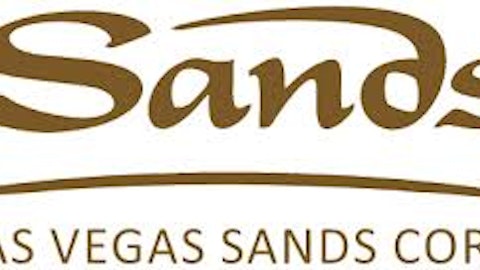
This double pressure from the U.S. and Chinese markets has put Las Vegas Sands Corp. (NYSE:LVS), the largest casino company in the world by market cap, in a tough spot. The stock, which has risen more than 2,000% since the dark days of the financial crisis, recently dipped under $50 for the first time in four months. Should investors consider picking up some shares of this volatile growth stock while the markets are off balance, or are lower prices coming soon?
A steadily growing industry in a volatile economy
Las Vegas Sands Corp. (NYSE:LVS), which is based in Las Vegas but generates most of its revenue from Asia, is the largest western casino operator in Macau, also known as the “Vegas of China.” For many years, gambling revenue in Macau soared by high double digits annually, and drew Las Vegas Sands’ American rivals, Wynn Resorts, Limited (NASDAQ:WYNN) and MGM Resorts International (NYSE:MGM), to the table as well. Although expectations have steadily declined to more reasonable growth projections, Macau casinos still reported a 13.5% year-on-year increase in gambling revenue in May – in line with analyst forecasts for 12% to 15% growth.
Although Macau’s gambling business is steadily growing, China’s GDP miss last quarter, its disappointing industrial growth numbers and concerns regarding the country’s banks have all heavily weighed on the stock. China’s interbank lending is currently over 13%, and the government has stated that it does not plan to intervene, as America did, to hold down these lending rates. This has led many analysts to speculate that China is hurtling towards a credit crunch that could cripple its economy.
Breaking down Sands by the numbers
To understand why investors are so worried about Las Vegas Sands Corp. (NYSE:LVS)’s exposure to the Chinese market, we should look back at its first quarter earnings, in which it reported a 13.1% year-on-year increase in profit on a 19.5% gain in revenue.

Source: Las Vegas Sands 1Q Earnings Report
Despite improved numbers in its U.S. properties at Las Vegas and Bethlehem, the company is still completely dependent on the growth of its four Macau properties, especially its flagship Venetian at the Cotai Strip (Macau’s equivalent of the “new” Las Vegas Strip), which generated $872.2 million in revenue, or 43% of its Macau revenue, on its own. Although revenue increased 13% last quarter at the Venetian, revenue slipped 11% at the older Sands Macao casino, which is located in the older part of the city away from the Cotai Strip. However, 39% year-on-year revenue growth is still admirable considering the bearish sentiment regarding China’s economy.
By comparison, Wynn Resorts, Limited (NASDAQ:WYNN) and MGM Resorts International (NYSE:MGM) generate 71% and 30% of their top line from Macau, respectively. Last quarter, Wynn’s earnings rose 52.6% as its revenue rose 5.0%. Its Macau business, which consists of two casino hotels, reported a 4.4% year-on-year gain in revenue. MGM Resorts, which owns a single casino through a 50% joint venture with Macau casino heiress Pansy Ho, squeezed out earnings of a penny per share last quarter, up from a steep loss of $0.44 a year ago, as its revenue rose 3%.
The Foolish Fundamentals
Compared to Wynn and MGM, which both have less exposure to Asia, Las Vegas Sands Corp. (NYSE:LVS) appears to be the better choice fundamentally.

Source: Yahoo Finance, 6/25/2013
Las Vegas Sands Corp. (NYSE:LVS) has the least debt, the best margins, and the cheapest P/E valuation. Its lower debt also insulates it slightly from rising interest rates.
The price of doing business
Yet those positive fundamentals only tell half the story. Las Vegas Sands is currently under investigation by the SEC regarding a possible violation of the Foreign Corrupt Practices Act. The company is being investigated regarding the possible bribery of foreign officials in Macau, as well as money-laundering allegations regarding two of its VIP high-rollers. These allegations originated from Steve Jacobs, the former CEO of Sands China, who filed a wrongful termination suit against CEO Sheldon Adelson after he was dismissed in 2010.
Las Vegas Sands is not the first company to come under SEC scrutiny. Last year, Wynn Resorts was probed regarding large donations to the University of Macau to support its new Asia-Pacific Academy of Economics and Management. Wynn made an initial donation of $25 million to the school, with a promise to donate $10 million annually between 2012 and 2022. Critics have claimed that those donations, aimed at currying the favor of the casino-license granting Macau government, constitute a violation of the Foreign Corrupt Practices Act.
Meanwhile, MGM was banned from expanding into Atlantic City after state regulators accused it of cultivating ties to Asian organized crime. New Jersey state regulators questioned MGM’s partnership with Pansy Ho, the daughter of Chinese-Canadian casino tycoon Stanley Ho, who has been rumored to have ties to the Hong Kong triads. Ho has denied these allegations. Casino operators have long dealt with the grayer areas of society, whether in Las Vegas or Macau. Wining and dining VIP high rollers with posh junkets and cozying up to local officials has long been “the price of doing business” for casinos. However, investors should be aware that the SEC is sending out a clear warning that these casino companies can’t carry on in Macau like its Las Vegas circa 1970.
The Foolish Bottom Line
In the end, investing in Las Vegas Sands is a bit of a gamble. On one hand, it is a rapidly growing company that is entrenched in two of the most lucrative gambling hotspots in the world – Macau and Singapore. On the other hand, it has raised the ire of aggressive SEC regulators and faces a possible credit crunch in China.
Investors should recall what happened to casino operators during the last credit crunch in the United States to get a grim picture of what could happen to Las Vegas Sands, Wynn and MGM in a worst-case scenario. However, patient investors who believe that Macau’s growth will continue despite macro challenges should consider investing in Las Vegas Sands, since it is much better positioned for long-term growth than its rivals.
The article Is This Casino Stock Worth the Gamble? originally appeared on Fool.com and is written by Leo Sun.
Leo Sun has no position in any stocks mentioned. The Motley Fool has no position in any of the stocks mentioned. Leo is a member of The Motley Fool Blog Network — entries represent the personal opinion of the blogger and are not formally edited.
Copyright © 1995 – 2013 The Motley Fool, LLC. All rights reserved. The Motley Fool has a disclosure policy.




